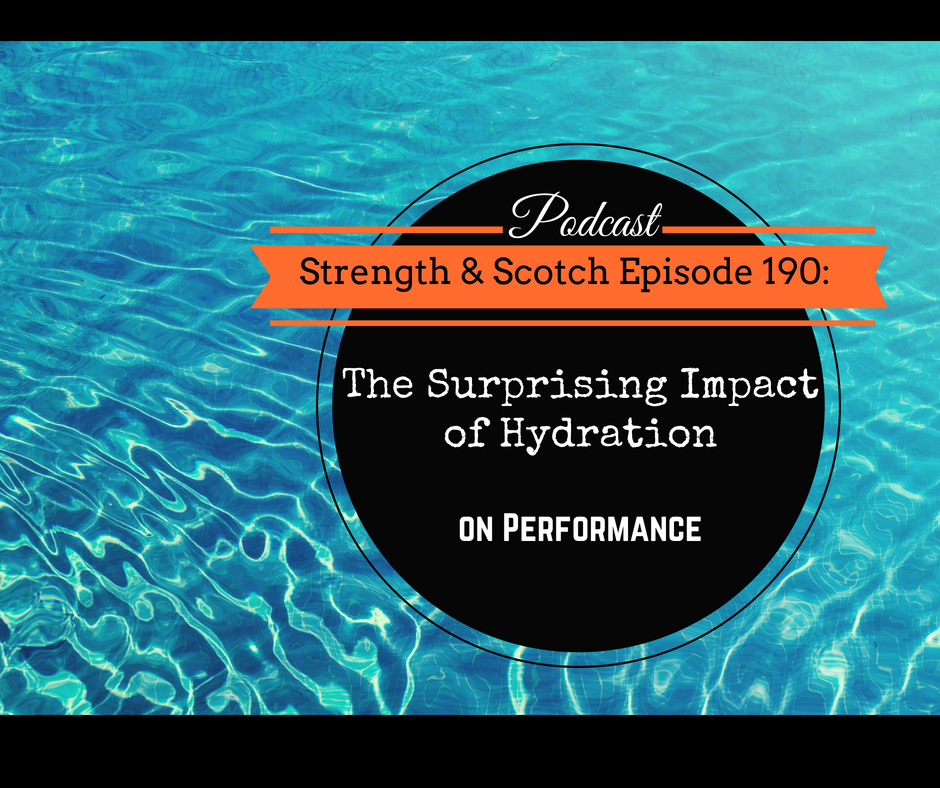SS 190 – The Surprising Impact of Hydration on Performance
Episode 190 Show Notes
Grant and Heavey talk about hydration among athletes and how it affects performance during training sessions. Is this something all athletes should do? But wait! How would you actually define who is an athlete? Is this something that any regular Joe could also benefit from? Listen in to discover the effects of hydration on performance.
[02:40] Have You Met the Federal Exercise Guidelines?
Grant dishes out a new CDC statistics report taking a look at the number of people in the US who have met federal exercise guidelines.
The federal guideline recommends that people between the ages of 18 and 65 engaged in at least, one or the other, of 150 minutes of moderate activity throughout the week or 75 minutes of vigorous activity. Surprisingly, 22.9% of people in the country meet those guidelines. Women were at 20% overall and men were at 29% overall. Colorado had the highest percentage at 33.6% of people who made the cut; whereas Mississippi is the lowest at only 10% for meeting those numbers.
Heavey suspects that the reason Colorado is doing so well is that it’s one huge city that’s sparsely populated. Unlike in California that has a handful of huge cities with a much higher population.
[08:40] Athlete Hydration: Does It Affect Performance?
Back in Episode 172, the show tackled hydration and the gist was that no one really knows where the 8 cups a day recommendation comes from. Most people can just let thirst guide them to stay properly hydrated unless your job requires vigorous activity, live in a very dry climate, or you’re an athlete.
Heavey mentions recently reading a paper about athlete hydration and how that affects performance. Grant briefly explains how Gatorade actually got its name from Florida University’s football team, the Florida Gators,and developed its product to improve hydration among their players. The football team drinking it started performing a lot better which gave them a competitive advantage. From there, it grew in popularity. With that being said, Grant says there really must be a real performance element to hydration.
[11:30] Dehydration from Sweat: How Much Are You Sweating Out?
Losing as little as 1%-2% of your body mass through sweat increases your heart rate, core temperature, and muscle glycogen usage. This also causes a decrease in cardiac output, cognition, anaerobic power, and increased time to exhaustion. Sweat rates, however, vary dramatically from person to person.
One study looked at 500 different athletes and found that their sweat rates ranged from 0.3 liters per hour to 5.7 liters per hour. That’s a massive range of difference.
[13:20] Are Athletes More Prone to Dehydration?
Most athletes use thirst to initiate their hydration. This may work for sedentary individuals but it’s not a great guideline for athletes. Moreover, the majority of athletes begin their training for competition in a dehydrated state.
In the study mentioned above, they looked at collegiate athletes. Everybody has a different definition of athlete though. To simplify, the more intense and regularly you’re training, the more you can benefit from paying attention to your nutrition. Between Heavey and Grant, they might not get much from doing this. However, people who aspiring to be competitive in Crossfit, powerlifting, or weightlifting probably need to pay attention to this.
Moreover, if you’re someone who really sweats a lot, this may be something you need to take a closer look at compared to somebody who sweats less where their dehydration levels are less than your own.
[15:40] The Study Protocol: Measuring Dehydration
When looking at dehydration, Heavey explains that you should be looking at both sweat and electrolytes. In the study, they looked at those doing moderate to hard training sessions lasting a minimum of 45 minutes. These were in-season athletes and they assessed both their fluid loss rate and their sodium excretion. Then, they designed a protocol based upon that.
To track their fluid loss, they were weighed before and after training and accounted for how much they drank during their training. They came up with the amount of water that was equal to. Then, they put sodium into that water based on the amount they were excreting and measured. They took that concoction, gave that to the athletes and drew lines on it for the marks they need to hit every 15 minutes during their training session.
[17:39] The Results: More Power and Better Cognition
The researchers had the athletes perform standing long jumps before and after the protocol. And they found a four-inch difference in inches when they long-jumped. So if you thought you’d be able to jump higher if you weighed less then that’s not the case. Basically, your ability to produce power diminishes.
If you’re a competitive athlete or training really hard, if you can stay hydrated throughout your training session, you’re going to be able to continue to produce more power. This means better performance.
Additionally, they had them track moving objects as a way to measure their cognition. They found that people with a tailored hydration plan had a 0.5 meter per second faster response. They were able to see and track things much better than those that didn’t adequately hydrate themselves. Grant adds this could be beneficial to people engaged in eSports or video gaming.
[20:55] How Boxers and MMA Fighters That Undergo Severe Dehydration During Weigh-Ins?
Heavey points out how fighters dehydrating themselves prior to a fight is an unhealthy practice. He believes organizations are changing some of the rules around so that you can’t manipulate hydration from a safety perspective. Clearly, people are putting their health at risk by doing this.
Heavey suspects these people are not able to recover their cognition or their power as strongly.
[22:10] Faster Recovery
The final thing measured in the study was the heart rates of the athletes, where they recovered significantly faster at the end of their training session. Again, they’ve gotten more power, faster tracking or cognition, and then now, faster recovery – all from drinking an appropriate amount of water and sodium.
There are also other studies that just looked at fluid replacement (which means no sodium). What they found was very promising, similar types of results just from water replenishment.
[22:57] Here’s Something You Can Try at Home!
This is something you might want to take more seriously. You could do this measurement at home. Weigh yourself (naked) right before you go into a training session, and then weigh yourself again after the session.
The difference between the two tells you how much weight you lost during your training session. From this, you can extrapolate out the amount of water that it’s equal to. This would give you an idea as to the amount of water you need to drink during your training. Use this as your approximate sweat rate.
[24:20] Assessing the Sodium Aspect
They said that no commercial sports beverage had a sufficient amount of sodium to compensate for the sodium excretion rates that the athletes experience during the study so they even had to salt the Gatorade.
At home, this could be difficult to measure. At a minimum, Heavey suggests that if you’re training five to six days a week for an hour or more intense sessions, make sure you’re replacing your sodium. A good starting point would be to look at how much is in Gatorade but this would be on the low end. Also, make sure you’re getting sodium in your diet, since a lot of times, people do clean eating diets and they end up going low sodium in their diet.
[26:25] Gatorade Zero
Grant shares an article about a new Gatorade product. Quick trivia: Gatorade has been around for 53 years now. And did you know that in all those years, Gatorade has never been sugar-free? A typical 20-ounce Gatorade has 34 grams of sugar. So just recently, they debuted the Gatorade Zero. It’s the first sports drink for hydration from Gatorade with zero sugar.
Another product BodyArmor, a new sports drink with Kobe Bryant as the top investor. Its sales grew 78% in one year from when it first went out. They are specifically marketed to athletes saying it works to “replenish your body with what you need without the crap you don’t need. Don’t go with Gatorade. It’s basically making kids sugar drinks.” Apparently, Gatorade Zero is Gatorade’s response to them.
Grant stresses the good thing about this is this is not just marketing BS. There has been a real study showing significant performance effects of staying hydrated.
Links:
CDC Report on People in the US Meeting the Federal Guidelines for Exercise
Episode 172: How Much Do You Need to Drink to Stay Hydrated?

Check out the gear page for everything Strength & Scotch! You’ll find a listing of all the supplements and other programs we’ve discussed on the show as well as our killer t-shirts!

